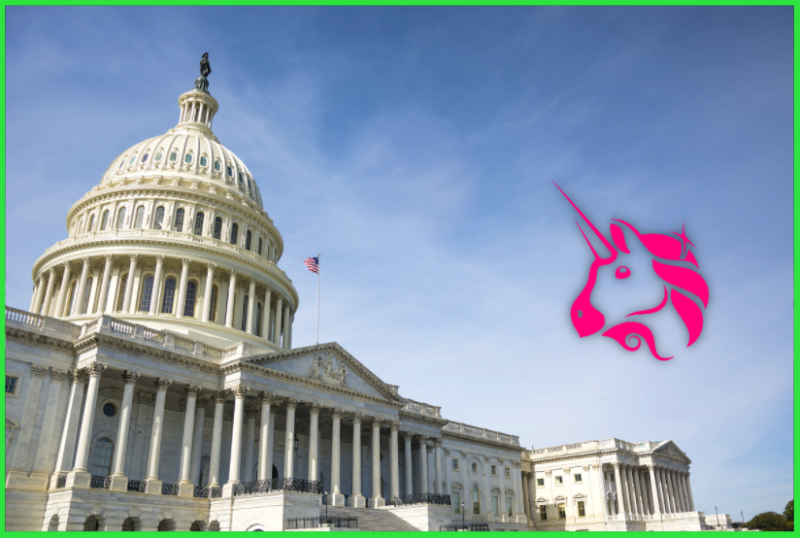Uniswap Drafted to Lead DeFi Lobbying Push in Washington
DeFi is going to Washington. A group of influential Uniswap users are proposing the formation of a DeFi political defense fund to address government action aimed at cryptocurrencies. At the top of the list: the Biden administration’s 2020 budget proposal, which includes a potential expansion of cryptocurrency asset reporting requirements While many investors in the…
By: Dan Kahan • Loading...
DeFi
DeFi is going to Washington.
A group of influential Uniswap users are proposing the formation of a DeFi political defense fund to address government action aimed at cryptocurrencies. At the top of the list: the Biden administration’s 2020 budget proposal, which includes a potential expansion of cryptocurrency asset reporting requirements
While many investors in the DeFi space are against centralized governments interfering with their crypto assets, the Uniswap governance proposal has been controversial, too. Not all agree that a single organization such as Uniswap, the decentralized finance protocol used to exchange digital tokens, should get to decide how to deploy lobbying funds and speak for the community.
Temperature Check
That didn’t stop the Harvard Law School Blockchain and Fintech Initiative (HLSBFI), a student organization that promotes education and career development, from drafting a Uniswap governance proposal on May 27. Called “Funding a Political Defense of DeFi” the plan is known as a “temperature check”– a designation for Uniswap governance proposals seeking to gauge community sentiment and feedback. The pitch could be the first move in the political halls of power for the DeFi movement. Uniswap founder Hayden Adams also tweeted the proposal.
Uniswap’s Hayden Adams
The proposal suggests setting aside 1 to 1.5M UNI ($27M to $40M USD) to create and fund a community-overseen organization to lobby for crypto policies. Citing concerns that governments around the world may try to regulate DeFi without proper education, the proposal aims to use the funds to educate policymakers, achieve regulatory clarity for DeFi, support DeFi and decentralized governance, and encourage other DeFi protocols to contribute ideas and support.
HLSBFI concluded their proposal temperature check with a link to a 2-day Snapshot Poll, and about two-thirds of votes supported the fund on May 29, with 34.05M UNI saying yes and 17.79M UNI voting no. (The poll required a minimum of 25k UNI voting in support in order to move forward to the consensus check phase, which will occur at an undetermined time in the future.)
The Debate
Meanwhile, DeFi community members weighed in on the proposal in the comments attached to it, with many suggesting that the idea had potential but wanting more details before they would be comfortable supporting it.
“I’m definitely intrigued by the idea, but am also hesitant to dedicate treasury funds to advance a diffuse public good without a direct tie back to how it benefits Uniswap, or thoughts on how we might cooperate with others on said public goods,’” wrote the pseudonymous crypto-influencer DCinvestor.
Robert Leshner, the co-founder of Compound, a DeFi lending protocol, expressed a similar sentiment, writing: “This is a direction that I hope Uniswap (and many more DeFi protocols) grow into over time. However, this proposal lacks crucial details that are necessary to prevent the Uniswap treasury from becoming a slush fund; who, what, where, why, how are all questions that need to be drilled into before committing tens of millions of dollars of resources.”
Alongside questions of fund allocation specifics, some users raised concerns over HLSBFI’s intentions.
“So HarvardLawBFI starts a proposal to fund a pro-DeFi lobbyist group?” wrote community member altGuber. “Who would this money go to? I call conflict of interest on this one, and am AGAINST this move.”
Certainly, as the DeFi space continues to grow, regulation will become a more pressing issue for many in the community. It is yet to be seen how the community at large will approach the practical details, but at the very least, HLBSFI’s Uniswap proposal signals a larger conversation on the horizon.
Advertisement
Get the best of The Defiant directly in your inbox 💌
Know what matters in Web3 with The Defiant Daily newsletter, every weekday
90k+ investors informed every day. Unsubscribe anytime.